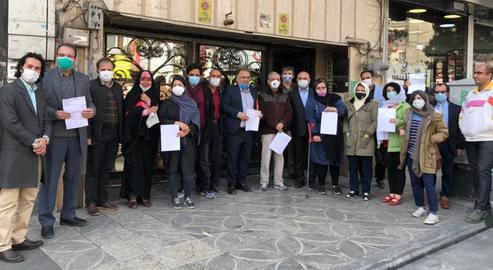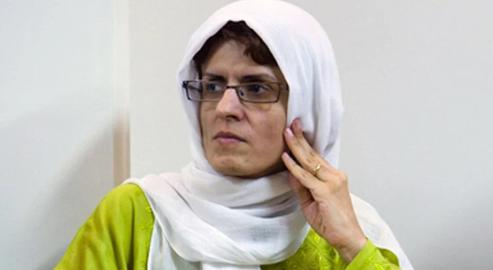On March 1, 2021, a group of Iranian journalists and civil rights activists gathered at the Electronic Judicial Services office in West Tehran and filed a complaint against the interrogators and officers who had held them in solitary confinement.
Part of their petition states that keeping people in solitary confinement "leads to a confession made under psychological torture", and that many such prisoners have suffered physical and mental illnesses as a result.
The group has called to an end to this inhumane method of pressurizing prisoners, which is considered a form of torture under domestic and international law. IranWire spoke with Jila Bani Yaghoub, a journalist and one of the plaintiffs, about why the lawsuit was filed.
***
Whenever an activist or member of the media is detained in Iran on political or ideological grounds, the question at the forefront of people’s minds is not why, but what forms of torture their guards are inflicting on them.
From the bloody 1980s onward, when stories leaked out of opposition activists being beaten with cables and hung up for hours with their hands cuffed, Iranians have become used to hearing these quasi-unbelievable stories of naked violence at the hands of the authorities. Countless more political and ideological prisoners have been physically tortured and even killed in custody since then. What came to be known about the horrific abuse in Kahrizak Detention Center after the 2009 Green Movement was one such example.
In the fact of with such atrocities, perhaps fewer people take time to consider the separate consequences of keeping human beings in solitary confinement. Fewer still may be aware that this, too, is a form of torture, though the law on it has always been plain.
When asked about the hardest part of their detention and interrogation, and about which act of cruelty traumatized them the most, many former political and ideological prisoners refer to the solitary confinement period. They refer to small, narrow rooms, to lights that are always kept on, and often to a stinking, unclean environment without basic sanitation. Worse still, though, they refer to the experience of solitary confinement itself: the hours that stretch, the fantasies that run through their minds, and the nights and days that are lost in succession, which stand as a double torment.
Solitary confinement is usually imposed on a prisoner during the interrogation phase. Thrown into a cell sometimes for days on end, the prisoner’s only windows to the world outside that horrible room are the voice, insinuations and threats of the interrogator. In essence, it is one of the pillars of interrogation in the Islamic Republic: one routinely employed by security agencies, prison guards, the intelligence services and accomplices of judicial officials to force detainees to say what they want to hear.
Now a number of formerly-incarcerated activists and journalists have now decided to take legal action against this dehumanizing form of torture, whose consequences they are living every moment of the day. These activists want to sue the instigators, perpetrators and agents of their torture and, in turn, launch an attempt to bring an end to solitary confinement in Iran.
Detainees Duped into Signing their Death Warrants
Jila Bani Yaghoub is one of the plaintiffs. The veteran journalist, a past winner of the International Women’s Media Foundation’s Courage in Journalism Award and the Reporters Without Borders Award for Freedom of Expression, has years of experience in the media and women's rights. She and her husband, the finance journalist Bahman Ahmadi-Amoui, were arrested and tortured in the aftermath of the 2009 protests.
Bani Yaghoub, who is now subject to a 30-year reporting ban by the Iranian authorities, told IranWire of her difficulties on being released from prison, and repeatedly confronted with questions about the type of torture she had endured. Many people, she said, seemed to be under the impression that only beating and flogging counted as forms of torture.
In fact, she says, "When a prisoner is beaten, the consequences may be easier to treat. The act can even lead to greater resistance in the prisoner. But in solitary confinement, a person is gradually deprived of their senses; they cannot hear, see, touch. According to psychological studies, when a person is deprived of their senses for a long time, he or she finds it easier to believe the first things they then hear and see.
"After my release I heard many stories of prisoners [in solitary confinement] who had begged to be taken for interrogation! After a long period alone, if an interrogator tells a prisoner they will be pardoned if they confesses to spying for Israel, the prisoner might well believe him. This is what happened to Ruhollah Zam."
Ruhollah Zam, a prominent opposition journalist in exile, was abducted in Baghdad in October 2019 after Iranian security forces lured him from France to Iraq under false pretences. He was held in solitary confinement and ultimately gave a forced a confession on Iranian state television, after which he was executed in December 2020.
"Zam was held in solitary confinement for more than a year,” Bani Yaghoub says. “They cut off all his communication with the outside world, leading him to be duped by security forces into believing that he was being held as part of a prisoner exchange. For this reason, he confessed against himself and was then executed. Prolonged solitary confinement inflicts such psychological trauma on human beings, and creates such emotional deprivation, that a prisoner may be willing accept any accusation against himself."
Endurance is No Measure of Torment
A glance at many of the documented reactions from members of the public and even activists shows there is still a stigma attached to having “broken” under torture and confessed. Some people accuse prisoners who complied with their torturers’ demands of having been weak, or even of having betrayed their cause.
"People may judge such prisoners as weak,” says Bani Yaghoub. “I myself have seen these kinds of judgments being made, especially against Ruhollah Zam. But have these people been in solitary confinement themselves?
“Yes, there are who resisted long-term solitary confinement. But the moral and physical constitutions of human beings differ. You and I, who are both physically fit, may find it harder or easier to cope with solitary confinement. A person with anxiety or people with a fear of captivity may be less tolerant. Our level of resistance in solitude does is not a measure of courage and resilience, but simply our ability to endure those particular circumstances. And tolerating something does not mean that it is not painful."
Bani Yaghoub’s husband, Bahman Ahmadi-Amoui, spend five years and four months in prison, during which he endured five months of solitary confinement in Evin Prison and then in Rajai Shahr Prison, the latter in a facility described as the "hell hole:" a tiny, cramped space in which the bad sanitation constitutes a form of double torture.
On being able to meet her husband after he spent month in solitary confinement, Jila Bani Yaghoub says the changes to his face and his weight loss were almost unbelievable. "The impact of that month was so obvious, it was worse than a hunger strike.
“There was no ventilation in the solitary confinement. Bahman did not have a place to sleep. The smell was terrible. The prison guards leave at 6.30 pm and do not return until the next day. Prisoners are not allowed to go to the toilet during these hours. Therefore, they drink less water and consume the smallest amount of food possible. Bahman said the smells of urine and blood mixed together. Some other prisoners were flogged and bled in the cell. They were rolling in their own urine and faeces. For how many days do you think a human being could endure in this situation?”
Forgotten Prisoners Still in Solitary Confinement Today
In Evin Prison in Tehran, the solitary cells of Ward 240 are known to be even worse. And it is hard to imagine – or to gather information – on the conditions endured by “security prisoners” in solitary confinement in other cities and border towns across Iran, whose voices are even less likely to be heard. Jina Bani Yaghoub lists three such people, who have been transferred from one prison to another for years and whose cases have been largely forgotten: Maryam Akbari, Zeinab Jalalian and Fatemeh Mosanna.
Maryam Akbari was arrested during the 2009 protests, and her family are understood to be members of the Mojahedin-e Khalq Organization. She has been in prison for more than 11 years without so much as an hour's leave, on charges of membership of the opposition group. She was missing for some time after her arrest, before being transferred to solitary confinement for 34 days and interrogated without a lawyer.
Zeinab Jalalian, a Kurdish woman, is thought to be the longest-service female political prisoner in Iran, having first been jailed in 2007. She has also spent protracted periods in solitary confinement and is losing her sight after years of torture.
Fatemeh Mosanna was arrested in 2013 on charges of supporting the MEK. She was held in solitary confinement together with her husband and her teenage child, after which she was sentenced to 15 years in prison.
What Can be Done?
According to the current laws of the Islamic Republic, political and ideological prisoners do not have the right to an independent lawyer during the investigation period. They can only use judiciary-approved lawyers, known as the "Article 48 lawyers”.
In many cases, detainees have allege that these lawyers colluded with the interrogator, citing their clients' confessions made under torture and in solitary confinement in court. For this reason, too, the activists have decided to file a lawsuit against all parties involved in the process.
But is there any hope for such a case to be advanced in the Islamic Republic? "I should clarify,” Bani Yaghoub says, “that we have no hope that the judiciary will investigate this complaint. Some may ask, then, what is the use of such an action?
“In addition to the fact that we have exercised this legal right, we can at least draw public attention to this issue in the hope that people realize what terrible pressure is being put on political and ideological prisoners. Isolation is torture, and in many cases worse than physical torture. People need to know that a confession does not come about by itself. People need to know exactly what conditions Ruhollah Zam and others, such as Ahmad Reza Jalali, were in, which caused them to confess against themselves. One has now been executed and the other is now on death row.
It is true that solitary confinement is a good tool for putting pressure on a prisoner, and it seems unlikely that the prison guard and interrogator will give it up, but we cannot and should not remain silent. We have faith in public opinion, and in large-scale protests."
Detention in solitary confinement, according to those who have experienced it first-hand, can cause devastating and sometimes irreparable mental and physical damage. Many such former prisoners have now risen up to take action against it; as ever, their chief obstacle is the absence of a fair and impartial judiciary.
In a statement shared with IranWire, the victims wrote:
"Solitary confinement is torture. It must be stopped.
"For many years, it has been commonplace for defendants to be held in solitary confinement at various times and in the degrading conditions of security cells, away from any supervision and control. Confessions obtained under the mental and psychological torture resulting from solitary confinement have led to harsh prison sentences, and even executions, by the courts. Solitary confinement has left many other defendants suffering from physical and mental illness.
"In addition, despite civil and human rights defenders' protests to stop the detention of defendants in solitary confinement, the practice remains the same, although it is not permitted in any of the legal provisions.
“As citizens of diverse political, ideological, and social persuasions, all of whom are victims of solitary confinement, we declare that the detention of defendants in solitary confinement is not only inhumane but also a clear case of torture under domestic and international law, and subject to prosecution.
"We therefore call for an end to this inhumane torture and for the dismantling of solitary confinement. We believe that all those responsible for solitary confinement should be brought to justice."
Related coverage:
Tales of Isolation, Creativity and Survival
IranWire Exclusive: Narges Mohammadi: "I Continue to Fight"
The Judge Threatened to Sentence Us to Death if We Didn’t Confess
visit the accountability section
In this section of Iran Wire, you can contact the officials and launch your campaign for various problems


























comments